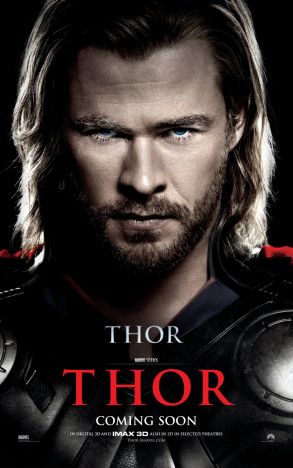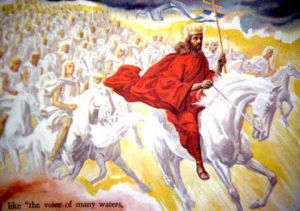Comics /
Spotlight /
Religion and Comics
Thor as Warrior Christ
By Andy Frisk
May 31, 2011 - 19:09
The Christian imagery in Thor (2011) is pretty obvious. Providing a detailed description of every Christian reference here would be laborious and, in some cases, insulting to the intelligence of the reader. Thor is the son of an Alfather god. He descends to Earth without his natural powers and becomes “just a man,” as he states. He sacrifices himself to save mankind from a fallen son of the Alfather. He is reborn more powerful than ever, and leaves our world after vowing to return to it. Granted, there are gross differences with the tale of Jesus of Nazareth and that of the movie version of one of Marvel Comics’ longest tenured superheroes. The underlying similarities in the imagery and basic story of the two are representative though of a long mythological and religious tradition. The story of the hero god who sacrifices himself, rises from the dead, saves mankind (metaphorically or otherwise), and vows to return one day to our plane of existence has been part of the human narrative for eons. These types of stories are told over and over again in the collective myths of mankind as the preeminent comparative mythologist, the late Joseph Campbell, demonstrated in his works The Power of Myth (1988) and The Hero with a Thousand Faces (1949). Thor (2011) is simply another story incarnation of the tale of the hero god. As Campbell showed us, the same, but best, stories, i.e. the ones that resonate within our collective unconsciousness the strongest, are often the most recognizable. Every time we hear these great stories, we recognize something in them that is deeply familiar and deeply stirring. If we didn’t, retellings of these same old stories wouldn’t occur as often, and as profitably. What is interesting about this tale, and many other similar tales of a savior/son of god, is that contrary to the message of the tale of Jesus of Nazareth, which was centered on peace and love, our modern messiah tales are based on war and love. Thor isn’t here to spread a message of peace and love per se. He does demonstrate love and humility through his sacrifice, but right after his resurrection he leaps into violent battle. Is this what we want from our modern messiahs? Is it a modern phenomena to want our messiahs to be warriors? Or is it just a continuation of the deep seated desire of the collective unconsciousness of mankind to want their god be better than another’s god while conquering territory and enemy armies for them? The answer is not simple, and can’t be answered in full here, but it is an important one culturally and psychologically to ask.
 |
There is a great deal made of the parts of The Bible that discuss the Apocalypse and the Second Coming of Jesus Christ, events which many have recently predicted and failed to see occur. Interestingly, in most modern Christian traditions, the return of Christ, a deity often referred to as The Prince of Peace, isn’t necessarily about establishing peace in the world. There is going to be peace eventually, but the thrust of the preaching, teaching, and proselytizing centers on the coming war to be fought in Megiddo and how the Anti-Christ (who ironically is a character who promises peace) will be defeated. It seems that Jesus is all about kicking some major butt and taking names, hopefully of which yours will be one, depending on how you see it. There is much more though to the story of Jesus than his ever approaching Second Coming. Much of the philosophy of Jesus can be summed up in his simple, yet poignant, saying, “You shall love your neighbor as yourself.” That doesn’t sound like something that a warrior god would be apt to say. In our times though, it appears that not many Christians or religious people are searching for a god of peace. The Western World, the seat of most of the world’s Christians, has been engaged in a state of constant war for a century now. World War I, World War II, The Korean War, The Vietnam War, the psychologically damaging (if not as physically damaging) Cold War, The Gulf War, The War in Afghanistan, and The War in Iraq have defined generations of men and women’s lives. Decades of fear of a Communist takeover (real or imagined) and/or thermonuclear war (a very plausible and justified fear), which lead into the equally fear inducing and seemingly never ending War on Terror (now redefined—thankfully), with a brief respite of about 10 years or so from 1989 thru Sept. 11th 2001, has forced these generations to live with the ever present anxieties of total annihilation. Is it any wonder then why we want our saviors to be warriors instead of peacemakers?
 |
As far as the character Thor is concerned though (as he relates to our look into warrior god stories) he was once incarnated as a sort of peacenik/environmentalist, and therefore much more peaceful in nature at heart, in opposition to his typical portrayal. In Mark Millar’s brilliant reimagining of Marvel Comics’ superheroes for a new age titled The Ultimates, that’s pretty much what Thor was. He was also portrayed as being perceived as being insane. Rejected and hunted down, Thor eventually proved his divinity and heroism by returning, in sense, at the end of The Ultimates 2 to save the world. Here was a Thor (as a warrior god/mythological character) who’s first goal was not to make war, but peace and love. He rose to the occasion when he needed to though, so even though he was a kinder and gentler Thor, he was still a warrior god at heart and in the end.
It’s fascinating that mythological/god characters like Thor, when they are often re-imagined or portrayed anew, take on Christ-like attributes, minus the peace and love message. Again, these meager musings on the subject are woefully inadequate to provide any type of answer or consensus thesis on the warrior Christ theme, but hopefully is insightful enough to shed some light on an idea that is definitely an interesting aspect of our society.
Last Updated: January 17, 2025 - 08:20

